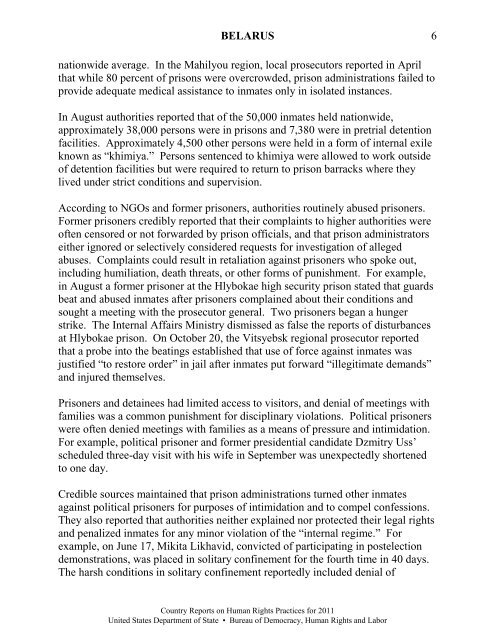belarus executive summary - US Department of State
belarus executive summary - US Department of State
belarus executive summary - US Department of State
You also want an ePaper? Increase the reach of your titles
YUMPU automatically turns print PDFs into web optimized ePapers that Google loves.
BELAR<strong>US</strong> 6<br />
nationwide average. In the Mahilyou region, local prosecutors reported in April<br />
that while 80 percent <strong>of</strong> prisons were overcrowded, prison administrations failed to<br />
provide adequate medical assistance to inmates only in isolated instances.<br />
In August authorities reported that <strong>of</strong> the 50,000 inmates held nationwide,<br />
approximately 38,000 persons were in prisons and 7,380 were in pretrial detention<br />
facilities. Approximately 4,500 other persons were held in a form <strong>of</strong> internal exile<br />
known as “khimiya.” Persons sentenced to khimiya were allowed to work outside<br />
<strong>of</strong> detention facilities but were required to return to prison barracks where they<br />
lived under strict conditions and supervision.<br />
According to NGOs and former prisoners, authorities routinely abused prisoners.<br />
Former prisoners credibly reported that their complaints to higher authorities were<br />
<strong>of</strong>ten censored or not forwarded by prison <strong>of</strong>ficials, and that prison administrators<br />
either ignored or selectively considered requests for investigation <strong>of</strong> alleged<br />
abuses. Complaints could result in retaliation against prisoners who spoke out,<br />
including humiliation, death threats, or other forms <strong>of</strong> punishment. For example,<br />
in August a former prisoner at the Hlybokae high security prison stated that guards<br />
beat and abused inmates after prisoners complained about their conditions and<br />
sought a meeting with the prosecutor general. Two prisoners began a hunger<br />
strike. The Internal Affairs Ministry dismissed as false the reports <strong>of</strong> disturbances<br />
at Hlybokae prison. On October 20, the Vitsyebsk regional prosecutor reported<br />
that a probe into the beatings established that use <strong>of</strong> force against inmates was<br />
justified “to restore order” in jail after inmates put forward “illegitimate demands”<br />
and injured themselves.<br />
Prisoners and detainees had limited access to visitors, and denial <strong>of</strong> meetings with<br />
families was a common punishment for disciplinary violations. Political prisoners<br />
were <strong>of</strong>ten denied meetings with families as a means <strong>of</strong> pressure and intimidation.<br />
For example, political prisoner and former presidential candidate Dzmitry Uss’<br />
scheduled three-day visit with his wife in September was unexpectedly shortened<br />
to one day.<br />
Credible sources maintained that prison administrations turned other inmates<br />
against political prisoners for purposes <strong>of</strong> intimidation and to compel confessions.<br />
They also reported that authorities neither explained nor protected their legal rights<br />
and penalized inmates for any minor violation <strong>of</strong> the “internal regime.” For<br />
example, on June 17, Mikita Likhavid, convicted <strong>of</strong> participating in postelection<br />
demonstrations, was placed in solitary confinement for the fourth time in 40 days.<br />
The harsh conditions in solitary confinement reportedly included denial <strong>of</strong><br />
Country Reports on Human Rights Practices for 2011<br />
United <strong>State</strong>s <strong>Department</strong> <strong>of</strong> <strong>State</strong> • Bureau <strong>of</strong> Democracy, Human Rights and Labor
















